FREEPORT — A dozen happy pigs are rooting around in their pen at the Miyake Farm.
One of them trots over to the electric fence, curious about the clicking sound coming from a camera. Another kicks up his heels cartoonishly as he plays around with his siblings. A third has a silver fish tail sticking out of his mouth.
Wait. A fish tail?
“They get to eat sushi-grade Japanese tuna every day,” says Chad Conley, who manages the farm. “Masa will trim a whole tuna, and there’s pounds and pounds of blood and scraps that can’t be used that normally, before the farm, were just going in the trash.
“But the pigs love it. They eat fish heads. They eat lobster bodies. They eat extra fat that we can’t use. They go crazy for it.”
These well-fed pigs are living in the three-acre backyard of one of the most popular chefs in Portland, Masa Miyake. In three or four months, they will be about 250 pounds, and their flavorful meat, bones and fat will be transformed into pork buns and pork stock, and used in whatever amazingly delicious creation leaps forth from Miyake’s inventive mind.
The Miyake Farm got its start this past spring growing pigs, pastured poultry and vegetables just as the chef was busy moving his first restaurant, Miyake, from its tight, tired quarters on Spring Street to its stunning new venue on Fore Street next to the Portland Harbor Hotel. Now he’s juggling the new place, the budding farm project and his second restaurant, Pai Men Miyake in Longfellow Square, with the help of his growing staff.
Miyake spends most of his time in the new restaurant and leaves chef Camille Mann in charge of the kitchen at Pai Men Miyake. Chad Conley, who is also a chef and most recently worked for organic gardening expert Eliot Coleman, manages the farm.
Miyake gets home from work after midnight, but rises around 6 a.m. or so to feed and water the animals himself before coming into Portland. It’s a tough schedule, but one that gives him great pleasure.
“I’m very, very busy,” Miyake said during a break between lunch and dinner service at the new restaurant, “but (it’s a) dream come true.”
TRAINED IN FRENCH, ITALIAN CUISINE
Miyake grew up in the Aomori prefecture in northern Japan, which is, coincidentally, Maine’s sister state.
He started working in restaurants in Japan as a teenager to support his artistic ambitions. At the time, his desire was to go into fashion design, but by the age of 20, he knew he wanted to be a chef.
Miyake was trained in French and Italian cuisine, and didn’t start making sushi until he came to the United States and worked for an American restaurant. (They assumed because he was Japanese, he must know sushi.) In New York, his days began at 8 a.m., and he would take the subway from his home in Queens and not return until midnight.
Miyake first came to Maine on vacation eight years ago. He visited Portland and Acadia, and thought he might like to move here: “Very beautiful, same coastline, and similar to my country.” He also thought that moving here was the only way he’d ever be able to afford his own restaurant.
Miyake spent the next three years vacationing in Maine to make sure that a life here was what he wanted and that he could make a living. He finally made the leap five years ago, when he was 43. But Portland felt too much like Queens, so he moved his family to Limington and got part-time work at Yosaku, the Japanese restaurant on Danforth Street.
The chef immediately began looking for land where he could fulfill his longtime dream of having “a country life” and producing healthy, local food for his own restaurant. Part of the dream came true fairly quickly: in 2007, he opened Miyake on Portland’s West End, where he prepared traditional Japanese fare fused with his French and Italian training.
The land hunt didn’t go as well, but he was so busy managing Miyake on his own that he wouldn’t have had time for a farm anyway. “In the beginning, it was very hard because nobody know me,” Miyake said in his heavily accented English. “I think when I move here, I almost give up, but God give me another chance.”
That chance came in the form of three acres in Freeport, behind the simple clapboard house where Miyake now lives with his wife, 12-year-old son and two daughters, ages 8 and 18.
The trees on the property were cleared last year, and in the spring, Miyake began working with Conley to decide what kind of poultry he wanted. Guinea hens were at the top of the list because no other Portland restaurants have them on the menu. The pigs were born and bought in May. Vegetables, including many Japanese varieties, were planted in June.
Miyake believes it’s important to have chefs who are also farmers, because bigger American farms are interested in “just making money” and growing things that are easy to sell. Chefs think about how things will taste, and aren’t afraid to experiment with growing or raising different things.
“This concept is very interesting for the chef and the farmer too,” Miyake said. “It’s not easy, but not easy means very exciting or challenging.”
Most importantly, he added, his new farm project will challenge him personally. He does not like to be bored.
“That’s why I’m keeping busy – exciting, challenging,” Miyake said. “That’s my style.”
GOOD FARE FOR FOWL
Chad Conley lifts the lid on a chirping box of day-old chicks that just arrived that morning. They are Freedom Rangers, a meat bird that are bred to be good grazers and reach slaughter weight in about nine weeks, three weeks later than industrial birds.
The chickens are moved around the pasture in portable pens so they have continual access to fresh ground.
“They’ll get more out of the grass and weed seeds and bugs than the standard meat chicken will,” Conley said.
Conley, 25, met Masa Miyake five years ago, when the former was working at Hugo’s restaurant on Middle Street and spending his Monday nights off working at Yosaku. “We kind of hit it off behind the sushi counter,” Conley said.
Conley then left Portland for about three years, about the same time Miyake opened his first restaurant. He worked for a time at Jean Georges in New York, then came back to Maine to work for and learn from organic gardening expert Eliot Coleman in Harborside.
Miyake had told Conley “when you come back, you have a job,” so earlier this year, Conley took him up on it. Now he manages Miyake Farm using both his culinary expertise and valuable lessons he learned from Coleman.
Today, there are only three guinea hens running around the farm, all escape artists who managed to avoid the previous week’s trip to the slaughterhouse in Gardiner. The farm’s first harvest was about 120 birds.
Some of the meat went to the new Miyake, where the legs were used for confit and the breasts were brined and grilled over binchotan, an aromatic Japanese hardwood charcoal. Rosemont Markets bought a dozen of the birds, and four went to Hugo’s.
“Guinea hen, nobody has that dish here. But they are challenging. The first (challenge) is I find them very noisy,” Miyake said, laughing.
Miyake Farm is also raising pastured turkeys, quail, Pekin ducks, Rhode Island reds and blue Swedish ducks.
More than 100 quail are kept in two pens, and the male’s whistling calls can be heard all over the farm. In one pen are birds that were hatched and shipped from a factory; in the other are birds from a local source. The local birds are two weeks younger, but about twice the size of the factory birds.
The birds will reach their slaughter weight at about eight weeks, but they reach sexual maturity at six weeks. So, for two weeks, the restaurants have been getting quail eggs. Conley recently decided to pull out a dozen or so healthy females before slaughter and keep them for a constant supply of eggs.
About three dozen Rhode Island reds share their pen with blue Swedish ducks that are being raised for eggs and a small pig named Icha. (“It means ‘cute love’ in Japanese,” Conley says.) Icha, just a quarter the size of her siblings, was the runt of the litter, and has now become something of a mascot for the farm. She had health problems, so Conley moved her in with the chickens to get her away from the other pigs and their porcine bullying.
The laying hens are depositing their eggs in a mobile cart designed by Coleman (who’s known for his mobile greenhouses) and built by Conley. They have dubbed it a “chicksaw” because it can be easily moved around the pasture by one person.
The details are still being finalized, but the farm may expand to 66 acres in Buxton sometime after Labor Day. More land would allow the farm to raise more pastured birds.
“I feel like we could sustainably raise between 700 and 900 birds using this system,” Conley said. “We would like to have our own slaughterhouse so that we can process our own birds. That’s something that would be great to get all the cooks involved with, and other employees in the company.”
Running its own slaughtering operation means a substantial investment, so the farm would have to raise birds to sell to restaurants and other buyers.
PLAYING IN THE GARDEN
The 2,000-square-foot garden is already large enough to supply vegetables for both of Miyake’s restaurants. An unfinished hoop house sits at one end; it will be used to grow greens this winter.
Conley says that during this first summer, he’s “just kind of playing around” in this chemical-free garden.
“The chefs, since they can use whatever I produce, I’m kind of having fun,” he said. “I’m trying three different varieties of daikon right now.”
Conley is trying out some Japanese herbs and vegetables, using seed from Kitazawa Seed Company in Oakland, Calif. Stepping gingerly between rows, he points out some mibuna, a Japanese green that grows about a foot tall and produces tight clusters of long, dark-green leaves.
There are also a few different chois and tat sois in the mix, and the small scallions the Japanese call negi.
“This is a nice one,” Conley says as he points out another bunch of greens. “It’s called ha gobo. Gobo is a burdock root, and this is a variety that’s grown for its leaves.”
There is Tokyo bekana (the Japanese version of a small Chinese cabbage), dwarf bok choi and Gai Lan, also known as Chinese broccoli. “They produce a single stem that you just blanch, and it’s super crunchy, juicy,” Conley said.
In another part of the plot is a small amount of buckwheat with small white flowers. There are just enough plants to make a couple of pounds of buckwheat flour. Conley has never grown grain before, but he wants to see if the flowers are edible, and then cut it down, dry it and use it for chicken feed over the winter.
Reaching down, Conley plucks a couple of thin, serrated leaves from an herb he’s growing called shungiku. It’s an edible chrysanthemum, and the piquant flavor is pleasant yet unlike anything else Mainers have likely seen on a dinner plate.
“As it gets bigger, (the flavor) probably gets a little too intense,” Conley said. “But I haven’t eaten it at any other stage. I’m not sure. I’m going to grow some of it pretty large and see what happens.”
Conley chuckles at the thought of this, but it’s the kind of experimentation he wouldn’t be able to do at a larger farm, and that’s fueling his enthusiasm for the job. It feeds the chef in him, as well as the farmer.
“I just understand the response those cooks are going to have when I bring in a guinea hen or this herb shungiku, which nobody has ever heard of,” Conley said. “I understand how exciting that is for a cook when that product is coming through the door.”
Staff Writer Meredith Goad can be contacted at 791-6332 or at: mgoad@pressherald.com
Copy the Story Link
Send questions/comments to the editors.


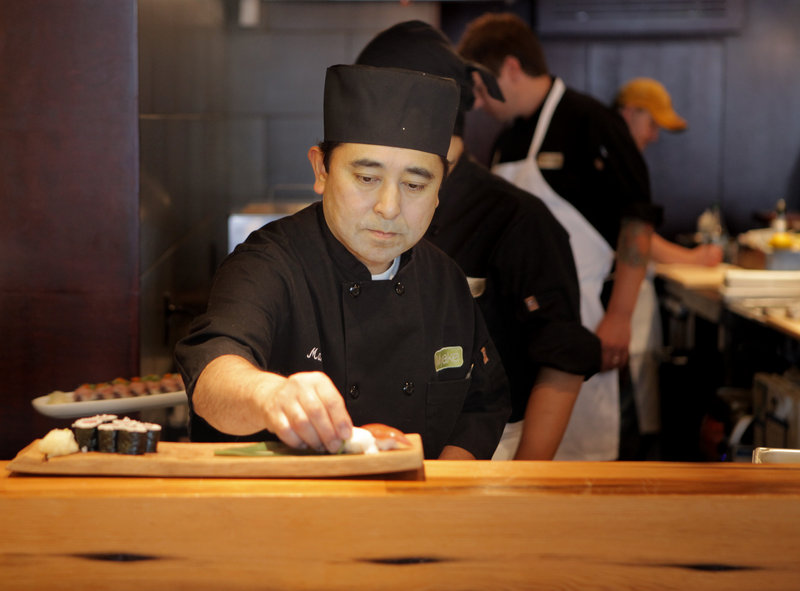
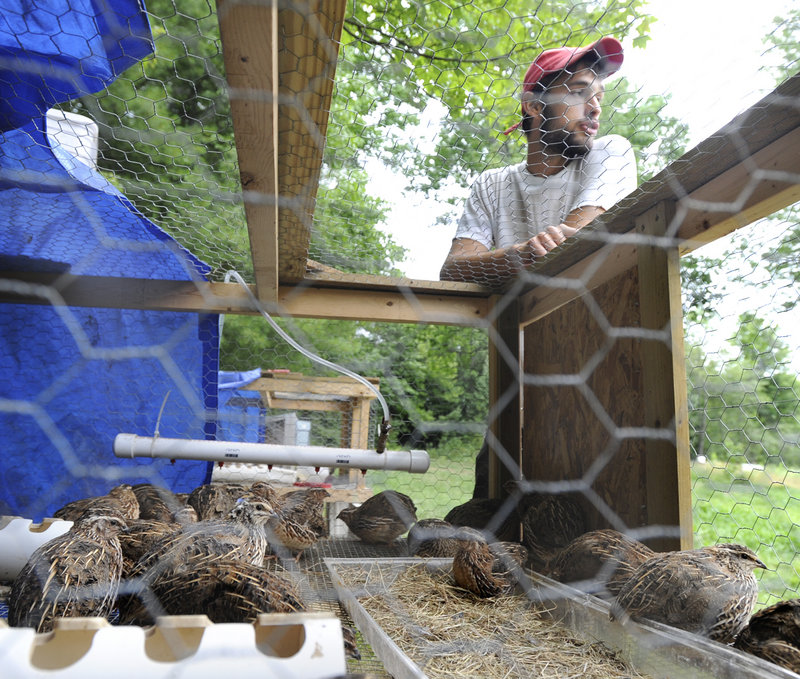
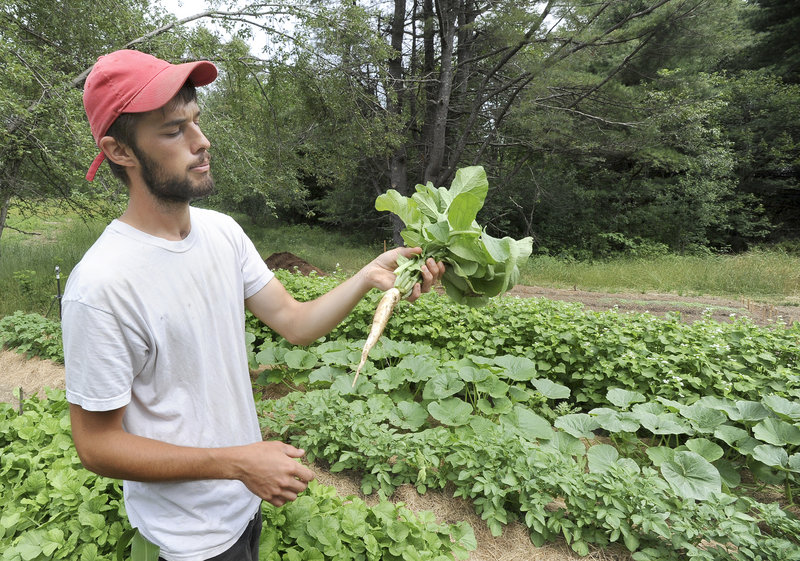
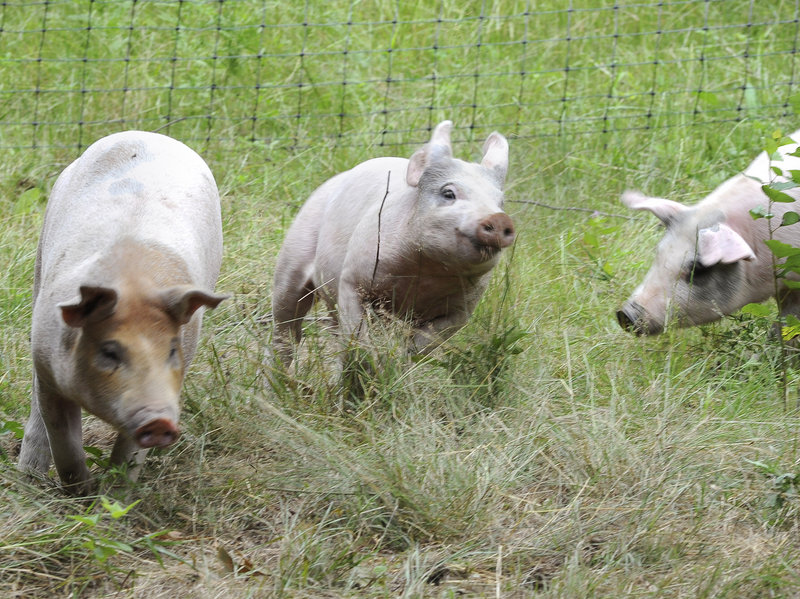
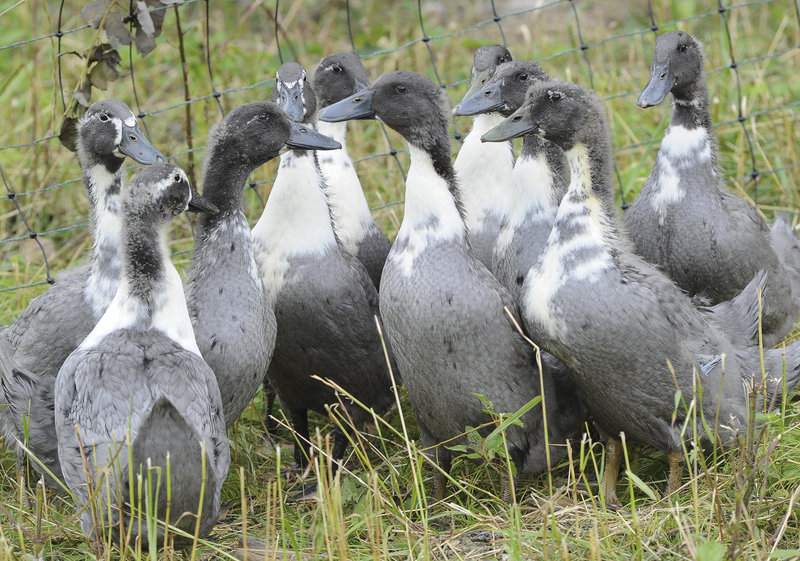

Success. Please wait for the page to reload. If the page does not reload within 5 seconds, please refresh the page.
Enter your email and password to access comments.
Hi, to comment on stories you must . This profile is in addition to your subscription and website login.
Already have a commenting profile? .
Invalid username/password.
Please check your email to confirm and complete your registration.
Only subscribers are eligible to post comments. Please subscribe or login first for digital access. Here’s why.
Use the form below to reset your password. When you've submitted your account email, we will send an email with a reset code.